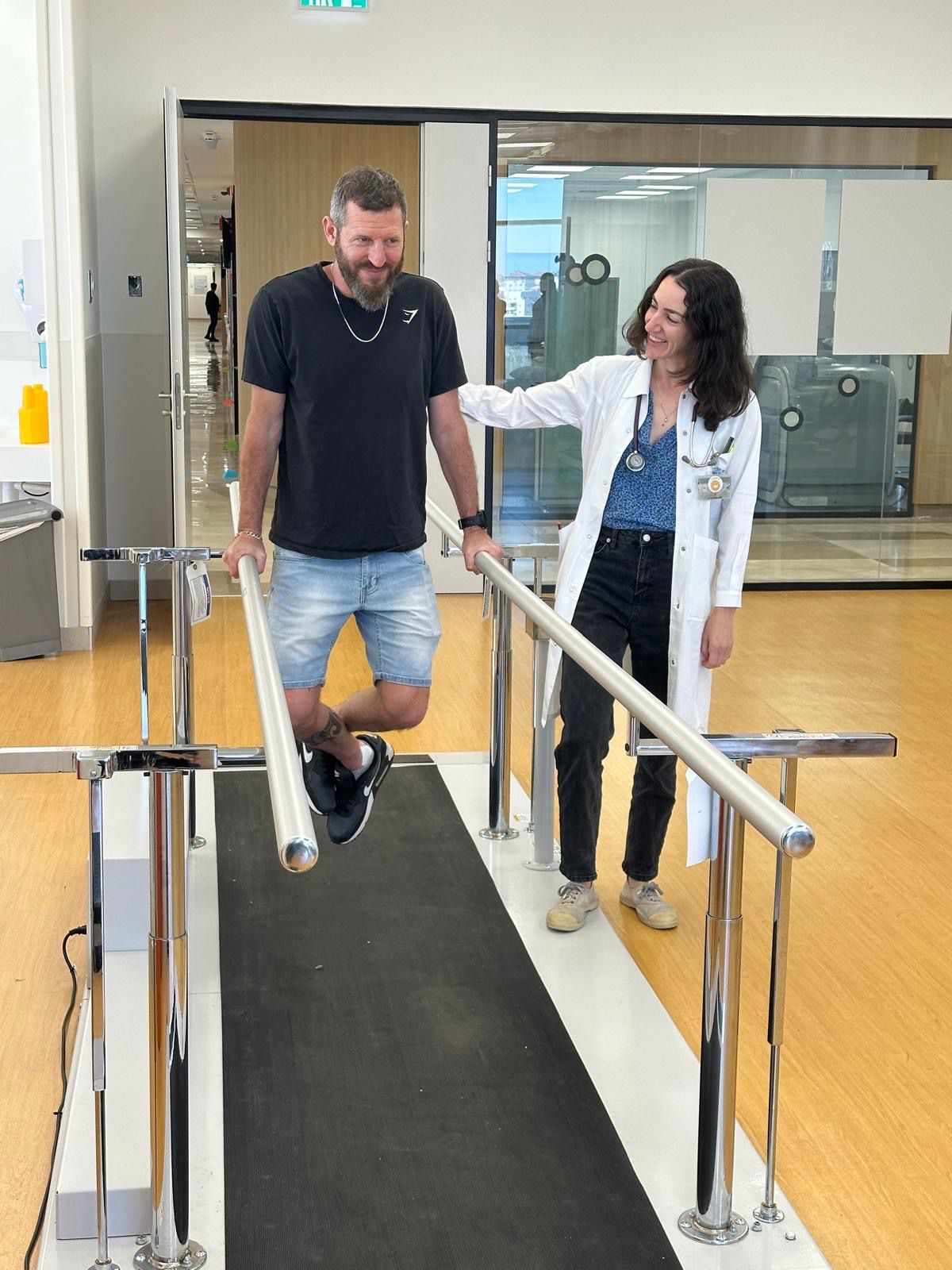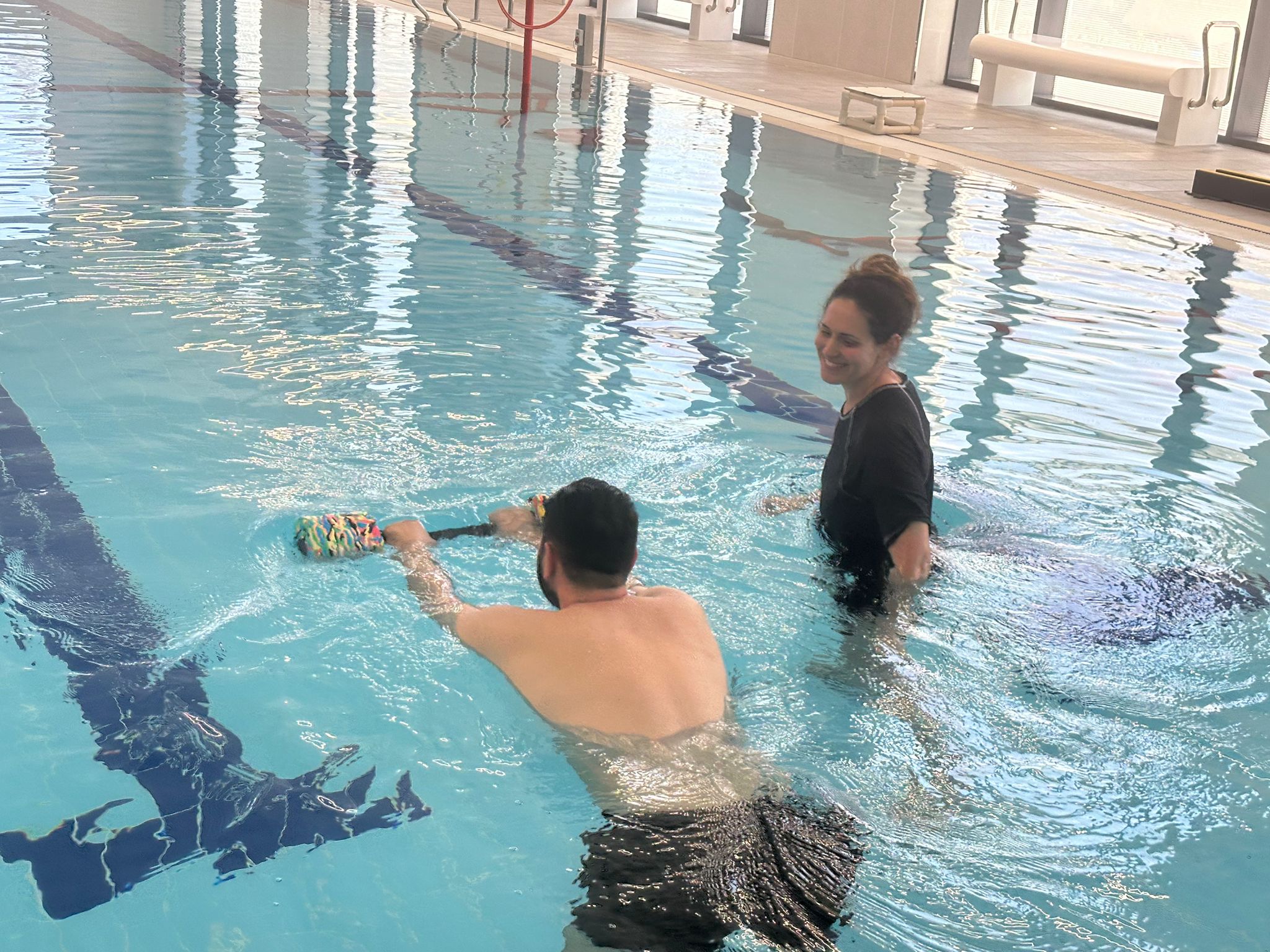Since the Israel-Hamas war broke out on October 7, 2023, the toll on Israeli soldiers has been staggering, marking one of the most significant human costs in the nation’s history. Approximately 800 soldiers have been killed in the ongoing war, and more than 6,000 were wounded.
Dr. Elior Moreh, head of the Department of Physical Medicine and Rehabilitation at Hadassah University Hospital-Mt. Scopus has been caring for injured soldiers since the war began. Since October 7, 2023, the hospital’s Gandel Rehabilitation Center has treated 200 soldiers, most of whom have complex injuries such as fractures, nerve damage, or complications from tourniquets.
Every day, we are reminded of the war through our patients’ stories while we deal with our own personal issues. One of our nurses lost her son Moshe Leiter in Gaza but manages to come to work four times a week and treat other soldiers. It has been tough, but as doctors and nurses, we are honored to help others this way.
That work has taken a toll on the medical staff. “Every day, we are reminded of the war through our patients’ stories while we deal with our own personal issues,” Dr, Moreh told The Media Line. “One of our nurses lost her son Moshe Leiter in Gaza but manages to come to work four times a week and treat other soldiers. It has been tough, but as doctors and nurses, we are honored to help others this way.”
Most of our patients were injured from explosions, including anti-tank missiles, projectiles, and bombs hidden by Hamas in Gaza and Hezbollah in Lebanon. The fractures caused by explosions are high energy, with many bone fragments due to the blasts. These often cause nerve injuries, gaps in the bones, and infections and may affect mostly arms, legs, and the eyes.
“Most of our patients were injured from explosions, including anti-tank missiles, projectiles, and bombs hidden by Hamas in Gaza and Hezbollah in Lebanon,” Moreh explained. “The fractures caused by explosions are high energy, with many bone fragments due to the blasts. These often cause nerve injuries, gaps in the bones, and infections and may affect mostly arms, legs, and the eyes.”

A soldier doing rehabilitation in Hadassah Hospital (Courtesy)
Like nearly every Israeli institution, hospitals around the country were underprepared for the October 7 attacks, Moreh said. “Due to short-staffed situations and overcrowding in facilities in the south, some patients had to wear tourniquets for up to 12 hours before being treated in more equipped hospitals,” she explained. “This caused severe complications like kidney failure, swelling, and compartment syndrome, which can lead to severe nerve damage.”
One of the soldiers treated in Hadassah is On, a 49-year-old commander from the 288th Brigade who was injured while fighting in Lebanon.
About 910 soldiers were wounded and 40 killed during the recent escalation with Lebanon.
Inside the house, there were also two Hezbollah terrorists. At a certain point, they opened fire towards our forces. The first shot killed four of our soldiers. Two more were badly injured, and a few more were injured to different degrees.
Give the gift of hope
We practice what we preach:
accurate, fearless journalism. But we can't do it alone.
- On the ground in Gaza, Syria, Israel, Egypt, Pakistan, and more
- Our program trained more than 100 journalists
- Calling out fake news and reporting real facts
- On the ground in Gaza, Syria, Israel, Egypt, Pakistan, and more
- Our program trained more than 100 journalists
- Calling out fake news and reporting real facts
DONATE [1]Join us.
Support The Media Line. Save democracy.

On told The Media Line that he was injured while clearing out ammunition from a civilian house in Lebanon. “Inside the house, there were also two Hezbollah terrorists. At a certain point, they opened fire towards our forces,” he said. “The first shot killed four of our soldiers. Two more were badly injured, and a few more were injured to different degrees.”
When On entered the building to retrieve his friends’ bodies, Hezbollah fighters threw a grenade at him. “I spotted the grenade as soon as it was between my legs,” he said. “I managed to turn around and move away a little, but then the grenade exploded, injuring my leg.”
Medical treatment is helping On walk again, and psychological treatment is helping him deal with the trauma. Despite psychological help, On said, the traumatic events will always be with him.
“I lost dear friends since the beginning of the war on the battlefield, and as a nation, we experienced the trauma of October 7,” he said.
One is the father of five children, the oldest of whom is serving in the military as well. “For my family, it has been far more difficult than it was for me because they stayed at home praying every day that I could make it and that I would be back,” he said. “Luckily, I am recovering and trying to be strong for all of them.”
Not far from On’s hospital room, Timor, a 29-year-old police officer from Sderot is being treated for injuries incurred on October 7.
When sirens started going off in Sderot that morning, Timor was at home with his family. He went outside to find eight people wearing Israeli military uniforms whom he realized were terrorists.
I took the service rifle and fired at them. I was in a car with another colleague that I found on my way. They kept shooting at us. I kept my window open and my gun ready to shoot back. Unfortunately, I got hit by bullets on my right arm and left leg, and I was later brought by the ambulance to the hospital.
“I took the service rifle and fired at them. I was in a car with another colleague that I found on my way. They kept shooting at us. I kept my window open and my gun ready to shoot back. Unfortunately, I got hit by bullets on my right arm and left leg, and I was later brought by the ambulance to the hospital,” he told The Media Line.
After multiple surgeries, Timor can move his arm again. He still has no feeling in his injured leg.
Timor’s mental health was also deeply affected by the attacks. He emphasized that he was close with many of the police officers who were killed. “Thanks to their sacrifice, many people survived,” he said. “We were the first ones to go out on the roads and fight back Hamas. I lost many of my friends that day. We are like family, and it was like losing a part of myself.”

Timor, a police officer who was injured on October 7, 2023, doing swim exercises. (Courtesy)
According to Israeli officials, about 3,000 troops are seeking psychological treatment for PTSD and other combat stress-related issues.
“I am grateful to receive psychological and physical help in the hospital, but sometimes it is very hard to adapt to this new reality,” Timor said. “I often have nightmares about what happened. I thought I wouldn’t have come out of that alive to see my dear ones again. I just wish to recover soon and go back home.”
As his mother, I want to stay here with him all the time to support him and show him he is not alone. I am happy that he is getting psychological support because if his psyche is taken care of, also his body may respond better to treatments. As a family, we also go through therapy to face the trauma we experienced.
Timor’s mother, Sigalit, told The Media Line she tries to spend every day with him in the hospital. “As his mother, I want to stay here with him all the time to support him and show him he is not alone,” she said. “I am happy that he is getting psychological support because if his psyche is taken care of, also his body may respond better to treatments. As a family, we also go through therapy to face the trauma we experienced.”
She said that the entire family was affected by Timor’s injury. “I knew my son had the duty to protect others, but I was very worried about his life,” she said. “When I got a call from the ambulance that he got injured, I felt powerless because I couldn’t even reach him, and I knew he was alone in a hospital in pain.”
New research is looking into the connections between trauma, recovery, and family support, Moreh said.
Families often remain in substantial distress, especially parents of wounded soldiers, so therapy is needed for them as well. Overall, families play a big role in Israel in helping in the recovery process of each soldier.
“Families often remain in substantial distress, especially parents of wounded soldiers, so therapy is needed for them as well,” she said. “Overall, families play a big role in Israel in helping in the recovery process of each soldier.”